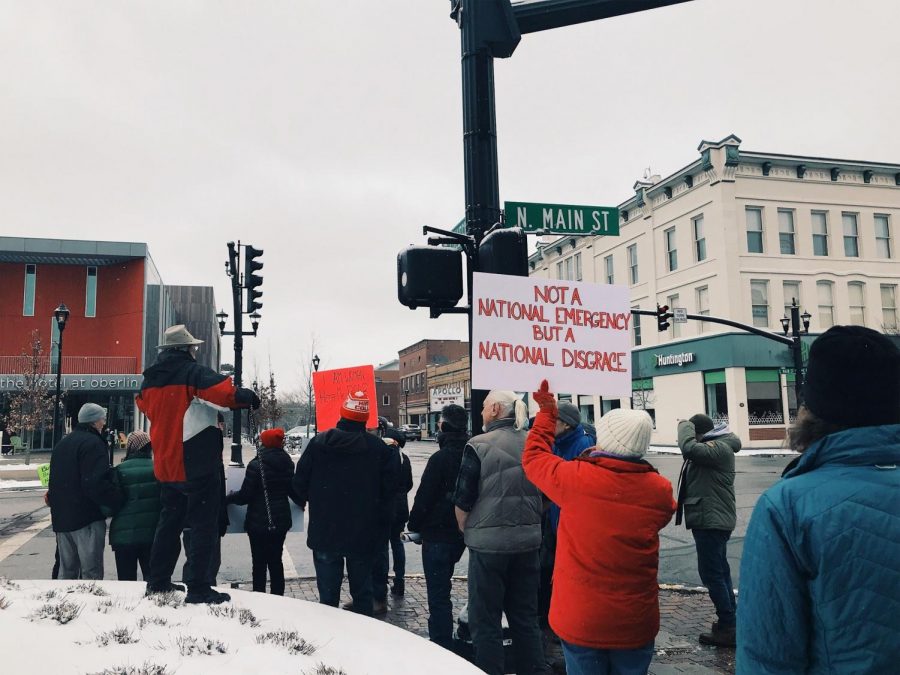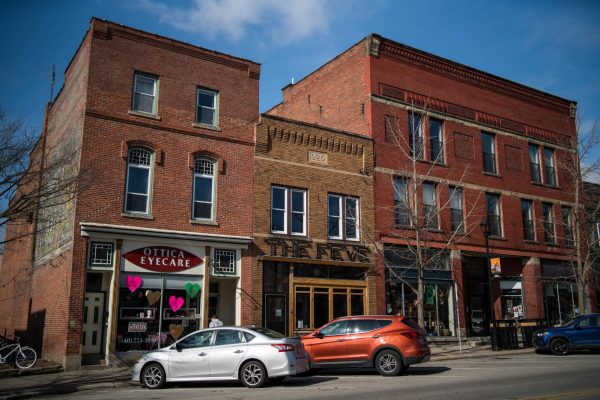Protesters Stand Against National Emergency
Protesters organized in downtown Oberlin on Monday to protest President Trump’s declaration of a national emergency.
A group of concerned Lorain County citizens convened in the southeast corner of Tappan Square on Monday to protest President Trump’s declaration of a national emergency. The demonstration was organized by local activist group Lorain County Rising.
The protest began at noon and lasted about an hour, drawing 40–50 protesters from Oberlin and neighboring areas. Attendees braved the 25-degree temperatures and intermittent snows to stand by the flagpoles on the corner of Main Street and East College Street. The rally included homemade signs and chants such as, “Hey hey, ho ho, Trump and his wall have got to go.” Many others expressed their support by honking at the group throughout the demonstration.
Lorain County Rising is a citizen-led advocacy group in Northeast Ohio that focuses on a host of progressive issues ranging from gerrymandering to the Affordable Care Act. Laura Irvin, a member of LCR, organized the protest.
“We have to come together as a nation to oppose this fake emergency,” Irvin said. “We are coming together and letting people know they are not alone.”
During the 2016 campaign, Trump ran on a promise that he would build a border wall once in office by having Mexico pay for the construction. Thus far, he has been unsuccessful with this approach. When it became clear that going through the U.S. Congress to obtain funding for the wall would also be unsuccessful, Trump declared a national emergency on Friday, Feb. 15, in order to obtain the $8 billion needed.
During the protest, some speakers condemned President Trump’s national emergency since many consider the move to be unconstitutional, as only Congress can control appropriations. One of these speakers was Oberlin resident David Finke, OC ’63.
“This is an important part of what a democracy is and how a democracy is defended,” Finke later said about his motivation for attending the protest.
During the demonstration, one protester held up a Constitution to represent the violation of Article I, which spells out the powers delegated to the legislative branch.
Other protesters were motivated by apprehension about the wall more generally.
“Walls are un-American and not useful,” said Masha Petersen, a participant in the protest. “Mexico is a partner in economy and culture and in so many other ways. We don’t need to go back into nationalism. It’s what led to World War I and World War II.”
Finke noted that the group that had gathered in Oberlin was part of a larger group of people who have expressed dissatisfaction with the president declaring a national emergency. Protests occurred across the country over the weekend and on Presidents Day, Feb. 18, including protests at the Trump Hotel in New York City, which prompted arrests.
As for Oberlin’s protest, many were pleased with the turnout.
“[It is] very successful [to have] between 45–50 people in 20-degree weather,” protester Victor Melfi said.
Some noted that even with the high participation, very few Oberlin students attended.
“We have had a difficult time finding the best way of communicating what is going on in the community with students,” wrote Lili Sandler, the founder of Lorain County Rising, in an email to the Review. “We have several student members who are happy to share events through the class Facebook pages, but when we’ve asked if there are other, more effective ways of letting students know about our events, there doesn’t seem to be a clear answer.”
Finke, who helps organize LCR events, also mentioned the difficulty of communicating with students, especially in comparison with his time as a student at Oberlin.
“Reflecting back [on] when we were in school here, the easiest way to get something announced was to get a message to a centralized office that produced a daily announcement sheet of things that were read at supper in every dining hall — and it was uncensored,” Finke said. “The technology has changed, you know, how word gets around the campus and I am assuming that there are things that students may check on a daily regular basis … but I don’t have access to those. I don’t know who does.”
Many at LCR would be interested in better connection between the college and the community.
“We’d always love to have more students at our events — they bring plentiful energy, different perspectives, and fabulous ideas,” said Sandler.







